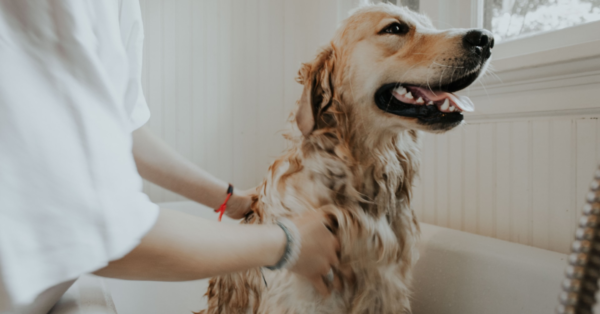Original Article: https://blog.theanimalrescuesite.greatergood.com/puddle-dangers-for-dogs/
Now that we’re in the autumn season, we can expect to see more rainy days between now and springtime. Rainy days can be wonderful for staying inside, curled up with a warm cup of something and a long list of binge-able shows on our favorite streaming service.
But once the rain goes away, most of us like to venture outside for some fresh air and a bit of a stroll. This is particularly true for those of us who have dogs.
Our pet pooches usually don’t like to be cooped up for too long, so at the first hint of sunshine, it’s time to get walking. But those of us that have dogs might not be aware of the dangers that come with post-rain walks with our pups – namely, the dangers that lie within puddles.

The problem with puddles isn’t just the worries that they might get all dirty and track mud back in the house. The worry is that they might get very sick from taking a drink of water. For some reason, our dogs tend to enjoy lapping at anything that’s wet on the ground. A gross little habit, I know, but they are at great risk of more than just an upset tummy from consuming standing water.
Article continues below
Our Featured Programs
See how we’re making a difference for People, Pets, and the Planet and how you can get involved!
Since standing water is a prime spot for bacteria to breed, our dogs can actually be facing some serious health concerns like Leptospirosis or Giardia.

Leptospirosis is also sometimes called lepto, and it’s an infectious disease that can infect both humans and animals. It is caused by the spiral-shaped bacteria known as leptospires. For a dog to come in contact with the bacteria, they would have to either drink contaminated water or have contact with the urine of an infected animal. Once the infection gets into the bloodstream, it will travel to the tissues, where it will mostly affect the liver and kidneys.
While most mild infections are something that dogs can recover from, for more severe cases there can be major damage – sometimes irreversible damage that can cause fatalities. The symptoms vary, but older dogs with weaker immune symptoms can particularly be at risk.

Common signs or symptoms of a lepto infection include:
– Lethargy and severe weakness
– Sore muscles and stiffness
– Fever
– Vomiting
– Diarrhea
– Abdominal discomfort
– Refusal to eat
– Weight loss
– Depression
– Jaundice
– Acute renal failure
– Blood in the urine may occur
– Respiratory distress
As for Giardia, that is a microscopic single-celled parasite that affects the intestinal tract. Inside the intestinal tract, the parasites reproduce and eventually become cysts that are spread through a dog’s feces. These cysts that are dropped are infectious and can survive in the surrounding environment for several weeks.

In order for a dog to become infected with Giardia, they will have to have swallowed the cysts. This typically happens after a dog drinks contaminated water, but it could also be a result of a dog eating grass or picking up balls/toys that have come in contact with infected feces.
The symptoms of a Giardia infection include:
– Diarrhea
– Gas
– Vomiting
– Dehydration
– Weakness
– Loss of appetite
– Weight loss
– Foul-smelling stool

For a Giardia infection, your dog will be prescribed medications. However, it should be noted that Giardia can pose a challenge to treat, meaning that oftentimes a dog will require several rounds of medication to cure. That is why it is best to keep your dog away from puddles.
Source: The Animal Rescue Site Blog












